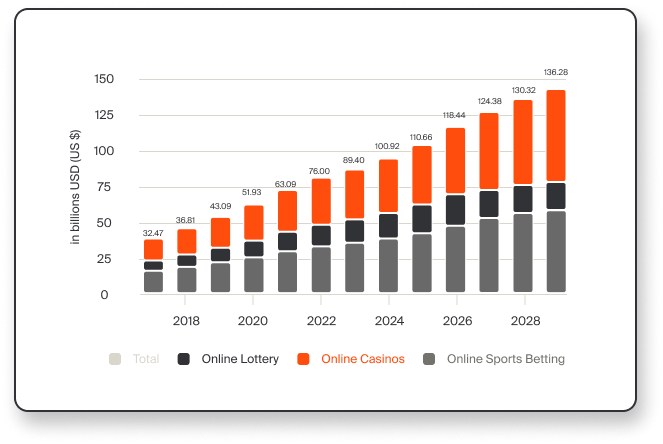iGaming
9 minutes read
Jun 14, 2024
What is iGaming? Definition, Types, Current Trends and Future Perspectives
The iGaming industry enters the top branches of the entertainment market with the constant growth of the players’ number and revenue. According to Statista, the overall sector’s revenue reached $89.4 billion in 2023, with a medium annual growth rate of 6.20%.

Source: Statista
iGaming Definition: What Does It Mean?
The term ‘iGaming’ derives from two words: Internet and gaming. As such, the sector digitalizes traditional gaming forms. Meanwhile, that is not the only difference between gaming and iGaming. The niche covers diverse forms of gambling games – i.e. sports betting platforms, online casinos, lotteries, online poker rooms, etc.
Hence, iGaming is a sector that comprises different variations of gambling games transferred to online platforms.
The industry’s history began in 1994 with the first online casinos. The same year the government of Antigua and Barbuda implemented a law to authorize casino business for all the country’s territory. By 2000 the overall number of iGaming players reached 8 million. As of today, about 4.2 billion (more than half of the total globe’s population) enter gambling games at least once a year.
Types of iGaming Businesses
This sector can be roughly divided into three core categories:
- Sports betting platforms;
- Online casinos;
- Online lotteries.
Sports Betting Platforms
Such a component of gambling games has gained more and more revenue over the years. In 2018 sports betting generated 38.8% of the overall sector’s coming-ins, and by 2023 this share had increased to 44.7%.
Sports betting is among the oldest entertainment types related to real money. The first bets appeared in Ancient Greece.
Up-to-date platforms provide users with ultimate functionality and a well-designed interface. Gamblers access tens of sports ranges and leagues. For the top-rated events, more than a thousand options are available. Furthermore, users may bet on cybersport tournaments, virtual sports events, and more.
Online Casinos
The core aim of this cluster lies in creating the atmosphere of a real casino. Gamblers access hundreds of diverse games designed by top-rated providers. Those are usually divided into the following categories: slots (multiple machines with different topics, winning combinations, reels, and bonuses), table games (roulette, baccarat, blackjack), and poker rooms.
At present one more category is gaining popularity – i.e. live casino games. Such a game takes place in a virtual space but broadcast in real time. Gamblers may communicate with a banker. Those games are as much closer to a real casino as possible.
Online Lotteries
The cluster transferred traditional lotteries into the online space. Gamblers purchase tickets and wait for a draw. The revenue from online lotteries doubled within the last 7 years – from $7.93 billion in 2017 to $16.62 billion in 2023.
Current Trends in the iGaming Industry
iGaming is a fast-growing sector that changes rapidly to fulfill all the demands of its target audience. What are the industry’s current trends that drive this entertainment market branch forward?
Licensing. The sector comes out of the shadows
For more than 10 years or so, the gambling industry remained out of law being prohibited or restricted in the vast majority of countries. Since millions of new players arrived in the market, governments understood the necessity of the gambling sector’s clear regulation.
As of today, Curacao, Antigua and Barbuda, Malta, Isle of Man, and Gibraltar are still the most chosen jurisdictions; meanwhile, iGaming companies get local licenses as well. Top-rated betting and gambling websites are frequently licensed in Spain, Lithuania, Estonia, Cyprus, etc. Clear regulation norms help them to expand their activity to new markets.
Here is the map that shows the attitude toward online casinos in different countries:

Source: Szilaghi Consulting
As we can see, most countries do not ban gambling websites. There are some limits and restrictions but the regulation has become much clearer.
Furthermore, a license is a must-have requirement for a new gambling website. Previously unlicensed sports betting and online casinos formed the industry’s majority. Frequently those platforms turned out to be fraud ones. Now players are more selective. They understand that a license is among the factors that protect their funds and guarantee fair gambling. The more powerful a license is, the better.
Security. Websites deal with trustworthy payment gateways
iGaming websites offer their clients to make a deposit and place a bet then. Under the exceptionally high competition, transaction processing time, variety of payment methods, and security issues do matter. Players prefer to join a platform where deposits are instantly processed and secured.
Gambling companies deal with top-rated providers that are responsible for all the financial stages.
Mobile Gaming. Shift Towards Smartphones
Gambling companies originally relied on their web versions, and today’s gamblers prefer on-the-go apps. This is why mobile applications are not a competitive advantage but a must-have option for all platforms. Within the last 10 years, smartphones reached the leading position among other devices used for betting.

Note: The table assumes that one gambler can use several devices for placing bets; which is why the sum of all lines is higher than 100%.
As we understand from the table given above, smartphones rapidly conquer the gambling market, and a top-class application is exceptionally important for an iGaming company. User-friendly interface, high functionality, and ease of usage are the three pillars of a successful app.
Social Interaction. Just Games Are Not Enough Anymore
A wide range of diverse sports events, online casino games, and lotteries are not enough for demanding customers. They want to interact with other gamblers; which is why top-rated platforms integrate chat rooms where gamblers may share experiences, communicate with each other, and talk about issues they are interested in.
Furthermore, iGaming platforms add leaderbooks to their websites and apps. Such a feature works like a perfect motivator that forces gamblers to become more involved in the process in order to find their nicknames among leaders.
Integration of Cryptocurrencies. Support of a Player’s Anonymity
Cryptocurrencies penetrate all the spheres more or less related to financial transactions. This new trend unlocks a set of ultimate opportunities for gamblers. Crypto assets are based upon the principles of anonymity, decentralization, and transparency.
While making a deposit, more and more gamblers want to transfer cryptocurrencies, and the market-leading platforms make it possible. Crypto payments are safe enough as gamblers do not disclose their financial information to third parties.
Crypto transactions cover 12.1% of all deposits transferred to online gambling platforms. Top-rated companies cannot ignore this innovation.
The given trends determine the modern development of the iGaming industry. At the same time, such a sector welcomes all the innovations. Which trends lay the foundation of the sphere’s future development?
Future Trends of iGaming: Innovations and Transformations
The recent technologies are being widely implemented into gambling platforms revolutionizing the sector. What is the future of iGaming? How can innovations change the sector?
Virtual and Augmented Reality (VR/AR)
VR and AR technologies are able to take the industry to another level where the boundary between virtual gaming and real-life completely disappears. The implementation of VR/AR innovations will unlock 3-dimensional slot machines, online casinos with a full immersion in the gambling atmosphere.
At present, some VR casinos and VR games have already appeared but the combination of Virtual and Augmented Reality with iGaming is still in the very beginning stage of development. According to analysts, by 2028 this market is expected to grow up to $15 billion.
While talking about future trends, two ways of further industry development are possible:
- VR casinos dominate the sector. Most players prefer VR gambling platforms to traditional ones.
- VR gambling platforms are just another option that coexists with traditional sports betting websites and online casinos.
Artificial Intelligence (AI)
Artificial Intelligence has already revolutionized tens of spheres. The AI market size grew from $93.27 billion to $135.94 billion within the past three years. By 2030, the analysts predict the market size to reach $826.76 billion. Artificial Intelligence is a new reality people are waiting for, and no sphere will be able to step aside from the changes.

Source: Statista
As for iGaming, AI technologies make gambling options more personalized. Artificial Intelligence processes giant amounts of data, points out players’ preferences and wishes, and tailors recommendations on how to improve gamblers’ experience. With the help of AI-driven solutions, players will get what they truly want.
Blockchain technology
Blockchain gambling is about to become one of the most popular subdivisions of iGaming. More and more platforms implement blockchain-related solutions to provide their users with the best-ever opportunities. There are several ways blockchain and iGaming interconnect:
- Crypto as a payment method. Sports betting platforms and online casinos offer gamblers to place crypto bets in BTC, ETH, LTC, etc. When depositing funds, users stay anonymous and do not disclose any information.
- Blockchain-based platforms. Gambling apps are deployed as decentralized ones having their own inner cryptocurrencies. All bets are placed in a blockchain to guarantee a fair gaming process.
- NFT tokens for VIP players. Non-fungible tokens may empower their owners with a set of unique opportunities. Gambling platforms may use NFTs as the right to access some VIP possibilities.
New gaming mechanisms
The more gaming mechanics are available, the better. Gamblers like variety; this is why top-rated platforms always add something new to their platforms.
Aside from sports betting, online casinos, and lotteries, new mechanics appear. For instance, gamblers may bet on financial markets – binary options allow them to decide whether an asset price will move higher or lower within the given time period.
In the future, even more gaming mechanics are about to appear to attract gamblers with something new and exciting.
Furthermore, today’s players expect to get all-in-one – different gambling options geared together within one platform. The industry-leading websites and apps unlock access to sports betting, online casino games, lotteries, TV games, and other opportunities.
Bottom Line: The Future of iGaming Industry – Further Development and Essential Changes
iGaming is a sphere that attracts half of the globe’s population. Since the 2000s the sector has been rapidly developing. According to analysts and experts, the cluster’s revenue is expected to increase by 52.4 percent by 2030.
The future development of iGaming is foremost connected with regulation and innovations. Gambling platforms get local licenses throughout the world and step by step come out from the shadows. The sector welcomes innovations that help improve player’s experience and offer clients whatever they want. Such innovations like VR/AR, AI, and blockchain promise to become an integral part of next-gen gambling platforms.
iGaming companies should understand that the industry faces an exceptionally high level of competition; which is why they need to provide their clients with high-end solutions only.
364

Written by Artem Goryushin
Marketing at FintechFuel
Writing about the exciting worlds of iGaming and the brokerage business, breaking down the latest trends and insights. Making complex topics easy to understand, helping readers stay informed and ahead of the curve.
More by authorRead more

Brokerage Business
10 minutes read
Sep 30, 2025
The brokerage industry in 2026 is entering a new phase shaped by technology, regulation and shifting client demands.


